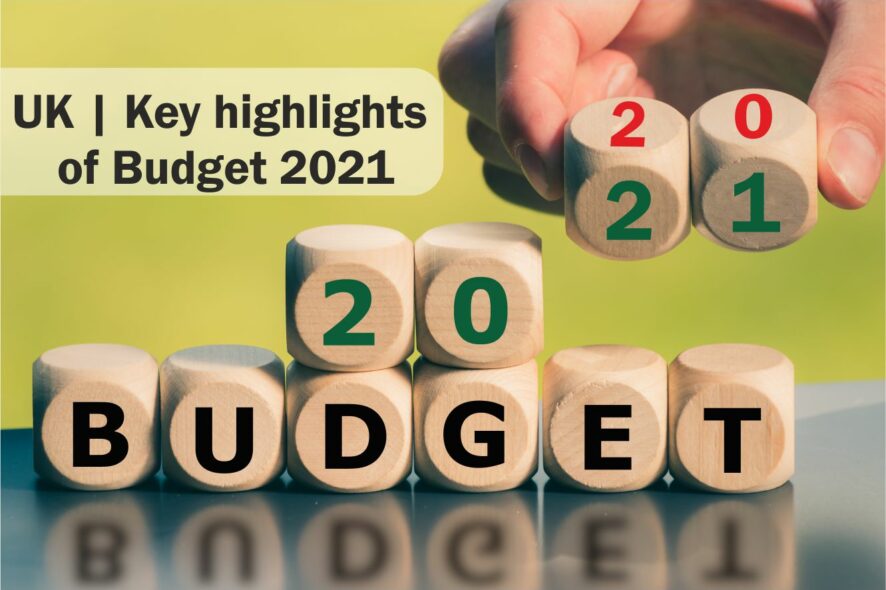Since the end of the Brexit transition period, this is the first Budget passed by the Government of the United Kingdom on 3rd March 2021. The Budget sets out guidelines to protect the economy, support the recovery and repair the public finances. It also aims to continuing to deliver first-class frontline public services, funding investment to level up across the whole of the UK, and creating an outward-looking, low-carbon, high-tech economy.
Key Features of the Budget are discussed below:
To reduce the Impact of Covid-19
- The Covid-19 Budget totals 352 billion euros across this year and next year’s support for individuals, businesses, and public services.
- The Coronavirus Job Support Scheme has been extended to September 2021 in the UK. The extension of the UK-wide Self Employment Income Support scheme to September 2021, with 600,000 more people who filed a tax return in 2019-20 now able to claim for the first time. There is also an extension to the cut in Stamp Duty Taxes until September to create jobs.
- The Budget extends business rate reliefs, Statutory Sick Pay support, and the VAT cut for the UK’s tourism and hospitality sector. The Recovery Loan Scheme will ensure that businesses in all parts of the UK can access the finance they need.
- The Gender Pay Gap Reporting has been extended till 5th October, 2021 for all employers with 250 or more employees to report their gender pay gap information.
Protecting jobs and livelihood
- The Budget sets out 5 billion euros for new Restart Grants i.e., for hospitality, accommodation, leisure, personal care, and gym businesses in England.
- A new Recovery Loan Scheme for issuing loans between 25,001 euros and 10 million euros to help businesses of all sizes through the next stage of recovery.
- An additional 300 million euros has been set out for Culture Recovery Fund to support cultural organisations. Also, the Film & TV Production Restart scheme in the UK has been extended.
- An Extension to the VAT cut to 5% for hospitality, accommodation, and attractions across the UK until the end of September, followed by a 12.5% rate for a further six months until 31 March 2022.
- 7 million euros for a “flexi-job” apprenticeship programme in England, that will enable apprentices to work with several employers in one sector. Additional 126 million euros for 40,000 more traineeships in England, funding high-quality work placements and training for ages between 16–24 years, in 2021-22 academic year.
- 19 million euros to tackle domestic abuse in England and Wales, with funding for a network of ‘Respite Rooms’ to support homeless women and a programme to prevent reoffending.
- Small and medium-sized employers in the UK will continue to be able to reclaim up to two weeks of eligible Statutory Sick Pay (SSP) costs per employee from the Government.
- To further support the cashflow of businesses, the government is extending the loss carry back rules worth up to £760,000 per company.
Strengthening public finances
- Maintaining the income tax Personal Allowance and higher rate threshold from April 2022 until April 2026.
- Maintaining inheritance tax thresholds at their current levels until April 2026. Alcohol duties will be frozen across the board for the second year running saving drinkers 1.7 billion euros.
An investment-led recovery
- The Budget sets out Eight new English Freeports.
- The ‘Future Fund: Breakthrough’ of 375 million euros will invest in companies such as those working in life sciences, quantum computing, or clean technology, that are aiming to raise at least 20 million dollars of funding.
- Reforms to the immigration system will help ambitious UK businesses attract the brightest and best international talent. A new Help to Grow scheme to offer up to 130,000 companies across the UK a digital and management boost.
- 2.8 million euros to support a UK and Ireland bid to host the 2030 World Cup and £25 million investment in UK grassroots sports, enough for around 700 new pitches.
- Publication of the government’s Build Back Better: our plan for growth’.
Immigration Reforms
The Chancellor of the Exchequer has announced proposals for reforms in UK Immigration Scheme. Some of them are:
- By March 2022, an “elite points visa” to be introduced, which will allow those who have a job offer to qualify for a fast-track visa.
- Global Talent Visa shall be reformed to allow the prize winning or scholarship winners for early promise to be qualified for Global Talent Visa.
- Global Business Mobility Visa is expected to be launched in Q2 2022 and would allow foreign business to establish or transfer employees to UK.
- The UK Government shall provide more process support for visa system for small business.
Scotland, Wales and Northern Ireland
Individuals and businesses in Scotland, Wales and Northern Ireland continue to be supported by the UK Government through the Coronavirus Job Retention Scheme, self-employment grants, loan schemes and VAT cuts. Devolved administrations have received Barnett funding to provide support in areas of devolved responsibility.
Source: HERE
*Tanvi Singh, Editorial Assistant has put this story together.






